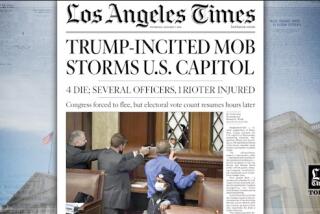Book Review: How the plan to fall apart soon fell apart
- Share via
The World That Never Was
A True Story of Dreamers, Schemers, Anarchists and Secret Agents
Alex Butterworth
Pantheon: 496 pp., $30
For more than 100 years, anarchism has been an embarrassing stepdaughter in the family of international radicalism, the one whose bad behavior makes it easy to dismiss the awkward questions she poses. Ever since Karl Marx got Mikhail Bakunin expelled from the First International in 1872, more disciplined revolutionaries have depicted anarchists as loose cannons incapable of building a new social order. The anarchists assisted them by embracing “propaganda by deed,” a phrase coined in 1876 to promote insurrectionary collective action that quickly became associated with bombings and assassinations perpetrated by small groups or lone individuals. Anarchists’ prescient warnings about Marxism’s authoritarian tendencies and their alternative vision of a humane socialism were discredited by violent acts that prompted the public to equate anarchism with terrorism.
Precisely how that fatal equation was formulated is the primary subject of historian Alex Butterworth’s stimulating, provocative book “The World That Never Was.” “My interest here,” he writes, “is merely to unpick the elaborate deceptions and intrigues generated by all sides, in an attempt to discern the confluence of factors that led to the first international ‘War on Terror’ and the consequences that flowed from it.”
Note that “merely”: This is not a comprehensive history of anarchism as a philosophy or political movement. (Readers who want that may usefully consult James Joll’s more conventional 1964 work, “The Anarchists.”) Also note the skeptical quotation marks around War on Terror; whatever the author’s feelings about the current crusade against Islamist extremism, he is at pains to debunk “the fanciful notion of an internationally coordinated anarchist revolution.” The real international conspiracy, he argues, was headed by a Machiavellian agent of the Okhrana (the Russian secret police), working in conjunction with similarly unscrupulous peers in London and Paris, supported by a network of spies who frequently acted as agents provocateurs.
Peter Rachkovsky is Butterworth’s principal villain, a shady character who began his career in black operations as a mole within the People’s Will, the revolutionary group whose assassination of Tsar Alexander II in 1881 set off a wave of repression sending many rebels into exile. In Switzerland, France and England, they inspired fellow refugees and homegrown radicals to dream of emulating the Paris Commune, a short-lived socialist experiment savagely suppressed by the Third Republic in 1871. Rachkovsky followed his prey abroad; as head of the Paris branch of the Okhrana, he planted agents among the émigrés who goaded angry, naïve young people into what the author describes as “heinous crimes of which they might never have otherwise conceived.” Butterworth credibly documents instances across Europe in which a mysterious figure appeared in anarchist circles, armed with cash and access to explosives, provoked them to target public places for maximum damage, then vanished just as the police swooped in — sometimes before the bombs went off, sometimes not.
It was a risky strategy, especially in England, where Special Branch officer William Melville kept a wary eye cocked on superiors who might like his results but were less prepared than their French or Russian counterparts to condone his tactics if they came to light. Unfortunately for anarchism’s reputation, it was a successful strategy, because leading theorists like Peter Kropotkin, while privately appalled by terrorist acts, were unwilling to publicly denounce them. There was more to anarchism than the belief that existing society must be destroyed so that a new socialist utopia could arise, but it was a founding principle.
Kropotkin and such comrades as Errico Malatesta and Paris Commune veteran Elisée Reclus, who had all served jail terms, knew that authorities would defend the status quo with every weapon at their disposal. The 1887 execution of four anarchists dubiously connected to a bombing in Chicago’s Haymarket Square grimly reinforced their belief that the capitalist democracies were also owned by the ruling class. They stood by, unable to distance themselves from a series of increasingly lunatic attacks in the 1890s that culminated, in 1900-1, with the assassinations of Italy’s Umberto I and U.S. President William McKinley. Propaganda by deed had become, in Butterworth’s cogent summary, “no more than envious arbitrary retribution; the last resort of the hopeless, the damaged and the dispossessed.”
The author’s acid descriptions of nefarious police maneuvers, the cynical manipulation of public opinion (inflammatory “anarchist” pamphlets written by undercover agents) and the arrogant intransigence of factory owners confident the government would take their side make it clear that he sympathizes with the anarchists’ revulsion at an unjust economic system and the political systems that protected it. He also understands that anarchists could be their own worst enemies, distracted from the hard work of building a popular movement by the glamour of revolutionary violence that made the bourgeoisie tremble. He grudgingly admires the “dark genius” of Rachkovsky, who not only blackened anarchism’s name but planted the seeds for future generations of malignant libels with “The Protocols of the Elders of Zion,” the anti-Semitic forgery that Butterworth and other historians believe was commissioned by Rachkovsky.
The main narrative closes with the Bolshevik Revolution, which anarchists were the first to denounce as a perversion of socialist ideals. The rise of fascism proved their point that state socialism could be as bad as capitalism. Butterworth’s deeply knowledgeable, exceedingly well-written text does not airbrush the weakness inherent in anarchism’s belief that a perfect society could arise only from mutual cooperation among enlightened individuals free of constraining hierarchies. Our knowledge of the terrible history of trying to create utopias by coercive means helps us share the author’s empathy for the anarchists’ desperate insistence on the primacy of individual conscience and liberty. Our knowledge of the polarizing political consequences of unfettered individualism and rote invocation of the word “liberty” may help us judge more gently anarchism’s destructive romance with violence, chronicled here with such intelligence and moral clarity.
Smith is the author of “Real Life Drama: The Group Theatre and America, 1931-1940.”
More to Read
The biggest entertainment stories
Get our big stories about Hollywood, film, television, music, arts, culture and more right in your inbox as soon as they publish.
You may occasionally receive promotional content from the Los Angeles Times.










